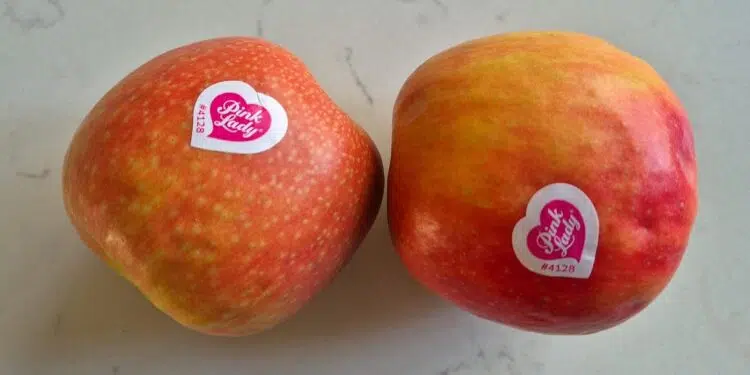I really like Pink Lady apples. We always buy them, there are always some, right on our kitchen table, in a nice “designer” basket that a friend gave me years ago. In short, they are appreciated and valued. I must say, even my dog loves the cores.
However, each apple has a sticker on it, a little heart, that guarantees that it is a Pink Lady, “An official symbol of pleasure. It is also a guarantee of authenticity and of the constancy of its quality throughout the year. To be a Pink Lady®, you don’t just have to want it,” the website of the Italian producer explains (but there are many in the other two production areas: in France, where these apples were born, and in Spain). The little heart is a sticker made of a material that looks like plastic, attached with glue (which is certainly not of the kind that is harmful to health). The sticker itself is produced in some sticker factory, which consumes energy to print, cut, and package it for shipping and then transports it to where the apples are labeled. Pink Lady production is going well. Last season, it totaled 225,000 tons in the three production zones, which, dividing by an average weight of 160 grams (at least, the ones I buy here in Belgium weigh that, but I think it’s a standardized value) means about 1,406,250,000 apples.
I have not been able to weigh the sticker. It is really a “nothing,” but when you attach 1.4 billion (maybe a little less, not all production is for retail), I imagine it weighs several hundreds of kilograms of unnecessary labels, not least because always, or almost always, these apples are packed in cardboard boxes, recyclable, FSC-certified, i.e., responsibly farmed, which usually contain six fruits. And are therefore easily recognizable by consumers.
I get hooked on this useless packaging. A while back, I wrote about coffee capsule boxes, which often have internal dividers to keep these capsules (usually aluminum, which we recycle here in Belgium) nice and tidy. Nice and useless, because these are not objects that can break by bumping into each other, they are not eggs.
In short, it seems to me that there is a lot to be done in the area of packaging. It seems to me that the European legislation now under discussion has reason to be and that there is a lot of room to make this service to consumers more sustainable, also considering the small unnecessary labels.
English version by the Translation Service of Withub









